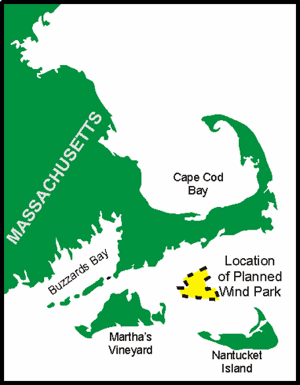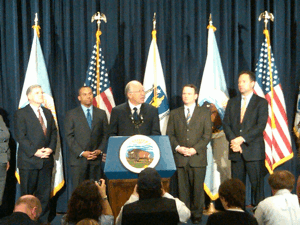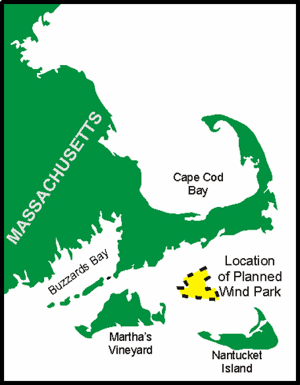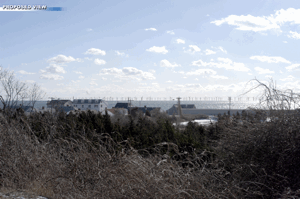A Win for Wind Power
Air Date: Week of April 30, 2010
 |
After a decade-long battle, the Cape Wind offshore wind farm has been approved by the federal government. Host Jeff Young talks with Denise Bode of the American Wind Energy Association about what the federal green light will mean for the future of wind power in the United States.
Transcript
YOUNG: While the Gulf is dealing with oil, the New England Coast is banking on the wind. Despite some strong objections, Interior Secretary Ken Salazar approved the permit for the offshore facility called Cape Wind.
SALAZAR: I am approving the Cape Wind project with modifications that will help protect the historic cultural and environmental resources of Nantucket sound. This will be the first of many projects up and down the Atlantic coast as we build a new energy future for our country.
YOUNG: Salazar says Cape Wind’s 130 turbines could generate 468 megawatts of carbon-free power, about as much as an average coal fired power plant. It could also generate a thousand jobs, something that excites Marty Aikens of the local electric workers union.

Ken Salazar (center) announces federal approval for the Cape Wind project. (Photo: Jeff Young)
AIKENS: This is about jobs; this is real jobs, clean energy for America. There’s tin knockers, there’s iron workers, there’s carpenters, there’s pile drivers, I mean—we’re all in this.
YOUNG: We asked Denise Bode, CEO of the American Wind Energy Association, to find out what the Cape Wind decision means.
BODE: It is a first major step forward to really creating a brand new source of electric generation that is even very high capacity generation because offshore wind is very reliable and if we get policies in place, the long-term commitment of a renewable electric standard and comprehensive energy policy and climate policy in place in the U.S. that will send the signal that that industry is ready to be built out here in the United States.
YOUNG: Give us a status report on the various offshore proposals. I hear a lot from different states—Delaware, New Jersey, Rhode Island—how many projects are in the works, and how close are they to getting in the water?
BODE: There’s a project in Delaware and three projects in New Jersey, two projects in Rhode Island and one in Texas, one in North Carolina, and then one in the Great Lakes from Ohio. So there are all up and down the coast in the Gulf and in the Great Lakes.
They’re taking a look at doing at, and in addition, there are others in the development pipeline, including projects off the Virginia coast, and near New York in Lake Erie, as well. Many of them actually already have signed, purchased power agreements with utilities and are being actively encouraged by the governor and the economic development in their home states.
YOUNG: So clearly there’s a lot of excitement about the potential here, but Cape Wind is not a done deal yet as the opponents are quick to point out. Here’s Audra Parker, she’s president of the Alliance to Protect Nantucket Sound:

The proposed site for the Cape Wind project in Nantucket Sound, Massachusetts.
PARKER: I think this is so far from over. State and local permits are being challenged in the state court. There is no sort of power contract for Cape Wind and we have an extremely strong legal case in the federal court, so I believe we will win.
YOUNG: So, what happens, Denise Bode, if Cape Wind ends up mired in court battles, what kind of signal does that send to these other offshore wind projects?
BODE: I think the main signal that we have is secretary Salazar declaring that he thinks this offshore wind project should go forward. So if not this project, clearly the next one that’s in the pipeline will know that they will receive long-term commitment from at least this administration to move forward on those.
YOUNG: Another thing the opponents of Cape Wind point out, and I think this also applies to the other projects potentially, and that is there’s no contract yet to sell the electricity produced into the grid. How big an obstacle is that? Can offshore wind be cost-competitive?
BODE: When you consider over time having higher capacity electric generation coming from these offshore projects, I mean, the end product is going to be very affordable over a 20- or 30-year period. So your upfront cost is going to be a little more expensive, but once you get the industry billed out, it’s going to be one that’s going to be very, very cost-competitive.
YOUNG: But we’re in such tangle in Congress trying to get a climate bill passed.
BODE: Right.

A simulation prepared by Cape Wind shows the view from Craigville, 6.5 miles from the windmills. (Courtesy of Cape Wind)
YOUNG: If that is, pardon the pun, but up in the air, isn’t offshore wind power up in the air, too?
BODE: The real ability to move on the ball forward on all these installations and manufacturing starts really is the renewable electric standard. But having that as part of a broader package that puts a price on carbon really cinches the deal.
YOUNG: The timing of these two events—the Cape Wind decision coming just as we’re watching this oil spill unfold in the Gulf—what does this tell us about where were headed with energy from our shores and the choices we have along our coasts?
BODE: Well, I bet those folks in Louisiana wish they had a wind farm down there as opposed to having those oil rigs. I mean the thing to take from this is that you have to make choices when you look at what your source of energy is going to be.
And we think we offer absolutely the best, most sustainable, supportable source of electricity out there. I think the turbines are magnificent, they’re a symbol of our dedication and our commitment to our kids’ future, and to having clean air, and having a clean environment, and to having jobs for them.
YOUNG: Denise Bode, CEO of the American Wind Energy Association. Thank you very much.
BODE: Wonderful to be with you.
Links
Secretary Salazar’s response to the ACHP comments.
Living On Earth Story: The Battle for Cape Wind
Living on Earth wants to hear from you!
Living on Earth
62 Calef Highway, Suite 212
Lee, NH 03861
Telephone: 617-287-4121
E-mail: comments@loe.org
Newsletter [Click here]
Donate to Living on Earth!
Living on Earth is an independent media program and relies entirely on contributions from listeners and institutions supporting public service. Please donate now to preserve an independent environmental voice.
NewsletterLiving on Earth offers a weekly delivery of the show's rundown to your mailbox. Sign up for our newsletter today!
 Sailors For The Sea: Be the change you want to sea.
Sailors For The Sea: Be the change you want to sea.
 Creating positive outcomes for future generations.
Creating positive outcomes for future generations.
 Innovating to make the world a better, more sustainable place to live. Listen to the race to 9 billion
Innovating to make the world a better, more sustainable place to live. Listen to the race to 9 billion
 The Grantham Foundation for the Protection of the Environment: Committed to protecting and improving the health of the global environment.
The Grantham Foundation for the Protection of the Environment: Committed to protecting and improving the health of the global environment.
 Contribute to Living on Earth and receive, as our gift to you, an archival print of one of Mark Seth Lender's extraordinary wildlife photographs. Follow the link to see Mark's current collection of photographs.
Contribute to Living on Earth and receive, as our gift to you, an archival print of one of Mark Seth Lender's extraordinary wildlife photographs. Follow the link to see Mark's current collection of photographs.
 Buy a signed copy of Mark Seth Lender's book Smeagull the Seagull & support Living on Earth
Buy a signed copy of Mark Seth Lender's book Smeagull the Seagull & support Living on Earth

